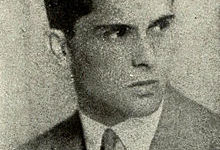- Images (1)
- Links (0)
- Agenda (5)

|

|
First an extra, Henri Chomette became the assistant to the directors Jacques de Baroncelli, Robert Boudrioz and Jacques Feyder. Throughout his life, Henri Chomette lived in the shadow of his brother René Clair, which earned him the nickname "clair-obscur". Very early on, he broke with the teaching of his masters and participated in the avant-garde movement by building a theory of "pure cinema", which gave great importance to the cutting and editing of scenes. This theory is illustrated by three silent short films: "Jeux des reflets et de la vitesse" (1923), "A quoi rêvent les jeunes filles?" (1924) and "Cinq minutes de cinéma pur" (1925). While his brother obtained his first success with "Un chapeau de paille d'Italie", Henri Chomette struggled with the comedy "Le chauffeur de mademoiselle" (1927). However, he definitively turned away from his theoretical concerns starting with Requin (1930). Resolutely anti-Semitic, he will soon only shoot for the cinema of the army and die in general indifference in Morocco.
"Chomette's works are not like the symphonic movements of Ruttmann or Gance. A few accords suffice to express a vision of the world through cinema and to show cinema itself.
It was only thirty years later, with Peter Kubelka's Schwechater, where he shattered cinema as a continuous movement to discover deeper elements, that such a "radical" and minimalist enterprise was to be found in its purpose and form. One minute was enough for Kubelka. Five minutes would have been enough for Chomette. »
(Prosper Hillairet in L'art du mouvement, édition Centre Pompidou, 1996, Paris, p.99).

|
CINQ MINUTES DE CINÉMA PUR
1925-1926 / b&w / silent / single screen / 5' 00 / 28 € or 27 € distribution: 16mm or Digital file on server |

|
JEUX DES REFLETS ET DE LA VITESSE
1923-1925 / b&w / silent / single screen / 6' 00 / 29 € distribution: 16mm or DCP on server or Digital file on server |